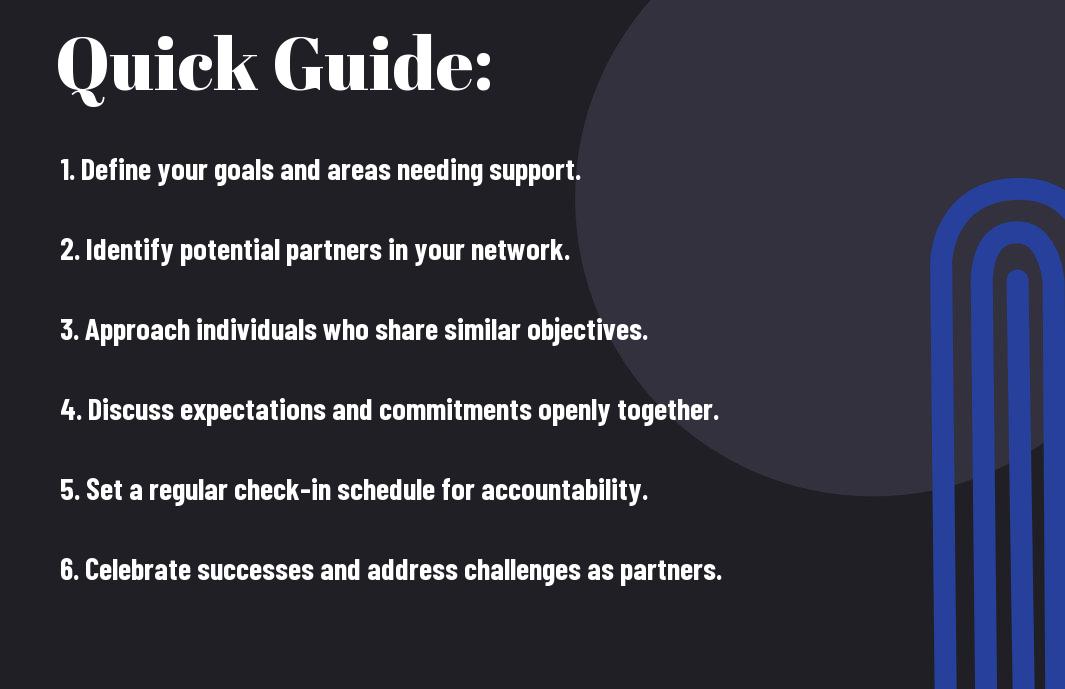This guide will help you navigate the process of finding accountability partners who can support you in achieving your goals. Accountability partners can significantly enhance your motivation and commitment by providing you with a reliable source of encouragement and feedback. In this post, you will discover practical strategies for identifying the right individuals, fostering meaningful connections, and establishing a framework that ensures mutual accountability in your pursuits. Embrace the journey of collaboration as you work together to achieve your aspirations.
Key Takeaways:
- Identify Goals: Clearly define your personal or professional objectives to find the right accountability partner.
- Choose Wisely: Look for someone who shares similar values, work ethics, and commitment levels to ensure alignment.
- Establish Communication: Set up regular check-ins via calls, texts, or meetings to maintain consistent support and reinforcement.
- Be Honest: Openly share your progress, challenges, and setbacks to foster a trusting and productive relationship.
- Set Boundaries: Discuss and agree on the limits and expectations of your accountability partnership to avoid misunderstandings.
- Offer Feedback: Be prepared to give and receive constructive criticism to help each other grow and improve.
- Celebrate Milestones: Acknowledge and celebrate achievements, no matter how small, to keep motivation high.
Understanding Accountability Partners
Before delving into the benefits, it’s vital to grasp what accountability partners are. They serve as your motivation allies—individuals who help you stay on track with your goals by providing support, encouragement, and constructive feedback. A good accountability partner challenges you while holding you responsible for your commitments, fostering a sense of accountability that can enhance your productivity and success.
Types of Accountability Partners
- Friends and Family
- Professional Coaches
- Peer Support Groups
- Colleagues or Accountability Groups
- Online Accountability Partners
Any of these types can provide unique benefits depending on your preferences and goals.
| Type | Description |
|---|---|
| Friends and Family | Personal connections who genuinely care for your success. |
| Professional Coaches | Trained individuals who offer structured guidance and expertise. |
| Peer Support Groups | Gatherings of individuals with similar goals for shared motivation. |
| Colleagues or Accountability Groups | Work-related partners who understand your professional objectives. |
| Online Accountability Partners | Virtual connections that offer convenience and diverse perspectives. |
Key Factors to Consider
For selecting the right accountability partner, evaluate several key aspects to ensure a compatible match that meets your needs. Think about shared goals, communication styles, and availability when making your choice.
- Shared Goals
- Willingness to Commit
- Communication Preferences
- Personal Connection
- Trustworthiness
Any of these factors can significantly influence the effectiveness of your accountability partnership.
The right partner should align with your objectives and support you actively. Consider how frequently you want to check in, and whether you prefer face-to-face discussions or virtual communication. Think about how both of you will celebrate milestones and address setbacks. Finding a partner who resonates with your work ethic and personal growth philosophy can amplify your results and keep you motivated.
- Alignment on Goals
- Mutual Respect
- Conflict Resolution Skills
- Consistency in Engagement
- Adaptability to Change
Any of these factors will enhance your accountability relationship significantly.


Tips for Finding the Right Partner
Some effective tips for finding the right accountability partner include:
- Identify shared goals and interests.
- Choose someone who respects your journey.
- Look for a reliable and supportive individual.
Assume that your ideal partner will inspire you while holding you accountable. For more insights, check out Finding an Accountability Partner: Why and How – ….
Assessing Compatibility
Any successful partnership starts with assessing compatibility. Look for someone whose values align with yours, as this shared foundation can significantly enhance your journey together. Consider discussing your goals, motivations, and expectations upfront to ensure that both of you are on the same page.
Communication Styles
Any relationship thrives on understanding communication styles. Recognizing how you and your partner interact can help you navigate challenges and successes effectively. It’s vital to discuss how you like to receive feedback and encouragement, as well as your preferred modes of communication, whether it be texts, calls, or in-person meetings.
Plus, knowing how to communicate helps prevent misunderstandings. Are you straightforward, or do you prefer a gentle approach? Establishing these preferences early on creates a synergy that makes accountability more productive and enjoyable. Ensure you both feel comfortable sharing your thoughts and feelings openly, which fosters a supportive environment for growth.
Step-by-Step Guide to Establishing Accountability
All successful accountability partnerships begin with a structured approach. Use the following table to outline the crucial steps in establishing a thriving accountability relationship.
| Step | Description |
|---|---|
| Identify Goals | Determine what you wish to achieve through this partnership. |
| Select Your Partner | Choose someone who aligns with your goals and values. |
| Set Expectations | Discuss what accountability looks like for both parties. |
| Schedule Meetings | Plan regular check-ins to discuss progress. |
Setting Clear Goals
Clear objectives are fundamental to your accountability journey. Define specific, measurable, achievable, relevant, and time-bound (SMART) goals to create a focused framework that guides both you and your partner. By articulating your aims, you facilitate open dialogue and track progress effectively, ensuring you stay aligned with your accountability partner.
Scheduling Regular Check-ins
Scheduling regular check-ins is pivotal to maintain momentum throughout your partnership. Establish consistent meeting times, whether weekly or bi-weekly, to discuss your progress, challenges, and achievements. Regular engagement fosters a sense of commitment and encourages both you and your partner to hold each other accountable effectively.
Check-ins offer a valuable opportunity to review your goals and address any obstacles you may encounter. Use these sessions to celebrate successes and brainstorm solutions for setbacks. Keeping the lines of communication open during these meetings will enhance your partnership, ensuring both parties remain engaged and motivated in pursuit of their goals.
Pros and Cons of Accountability Partnerships
Now, understanding the pros and cons of accountability partnerships can help you make an informed decision about whether to find a partner. Here’s a breakdown of the benefits and potential drawbacks:
| Pros | Cons |
|---|---|
| Increased motivation | Dependency on partner |
| Shared resources | Conflicting goals |
| Regular progress tracking | Possible interpersonal issues |
| Enhanced goal clarity | Time commitment |
| Support during difficult times | Potential for mismatched accountability styles |
Benefits of Having an Accountability Partner
Clearly, having an accountability partner can significantly elevate your journey toward achieving your goals. The motivation from another person can instill a sense of commitment that fosters consistent action. Additionally, shared knowledge, resources, and experiences can enrich your growth, making the process of reaching your goals more enjoyable and rewarding.
Potential Drawbacks to Consider
The potential drawbacks of accountability partnerships can impact your progress if you’re not mindful. While a partner can provide motivation, you may become overly reliant on them, which can hinder your ability to stay self-motivated. Conflicting goals or communication styles may also create challenges, resulting in frustration rather than support.
Partner dynamics can vary greatly, and if compatibility is lacking, it may lead to ineffective accountability. If your partner is not as committed or engaged as you are, you might feel disheartened. Moreover, if disagreements arise, they can create tension, detracting from the positive experience you’re seeking. It’s important to select a partner carefully to mitigate these risks and maximize the benefits of your partnership.

Maintaining the Accountability Relationship
Unlike a one-time event, maintaining an accountability relationship requires continuous effort and communication. Establish regular check-ins to discuss progress and obstacles. Encourage honest feedback and ensure that both you and your partner feel comfortable sharing struggles and successes. Fostering a supportive atmosphere can deepen your connection, making it easier to stay focused on your goals together.
Strategies for Sustaining Engagement
The key to keeping your accountability partnership thriving is to implement diverse strategies that promote ongoing engagement. Schedule regular meetings, set specific goals, and incorporate fun challenges or rewards that motivate both you and your partner. Sharing resources, like articles or videos, can also spark valuable conversations and keep motivation levels high.
Recognizing When to Reassess
With time, you may find that the dynamics of your accountability relationship shift. Stay attuned to any signs of disengagement, like missed meetings or lack of communication, as these can indicate it’s time for a reassessment. Discuss your concerns openly with your partner to determine if adjustments are needed.
Understanding when to reassess your accountability partnership can help you both maintain motivation and productivity. If you notice that the initial excitement has waned, or if either of you is facing a new life stage or shifting goals, a conversation is warranted. Discussing changes can lead to redefining your goals or modifying the structure of your meetings, ensuring that the partnership continues to meet your evolving needs.

Resources and Tools for Support
Despite the challenges of finding the right accountability partner, there are numerous resources available to help you in your journey. You can learn more about How To Be an Effective Accountability Partner at Work, which can guide you through the nuances of accountability partnerships. Utilizing these resources can provide additional perspective and support as you seek to achieve your goals.
Apps and Platforms
Support your accountability partnership by using various apps and platforms designed to facilitate goal tracking and communication. Consider tools like Trello for project management or Slack for ongoing discussions, allowing you to stay connected with your partner and monitor your progress effectively.
Books and Online Communities
Now, stepping into literature and online communities can significantly enhance your understanding of accountability partnerships. You can find insightful books that cover strategies and personal stories related to accountability, while also engaging with online forums where you can connect with others facing similar challenges.
Tools such as book recommendations or online forums can provide a wealth of knowledge. Look for inspiring titles that cover personal development and goal-setting, or join communities on platforms like Reddit or Facebook that focus on accountability. Engaging with like-minded individuals can not only motivate you but also offer valuable insights from others who have navigated similar paths.
Summing up
Now that you’ve explored how to find accountability partners, you can take the next steps to bolster your personal or professional growth. Focus on defining your goals, seeking individuals who share your vision, and establishing a structured partnership that suits both of your needs. By actively engaging in consistent communication and support, you can create a motivating environment that enhances your accountability journey. Each step you take with your partner can lead to increased productivity and success in achieving your objectives.
FAQ
Q: What is an accountability partner?
A: An accountability partner is someone who supports and motivates you to achieve your goals. This person helps keep you on track by discussing your progress, offering encouragement, and sharing feedback.
Q: How do I find an accountability partner?
A: To find an accountability partner, consider reaching out to friends, family, colleagues, or members of online communities who share similar goals. You might also look for workshops, social media groups, or local clubs that focus on your interests where you can meet potential partners.
Q: What qualities should I look for in an accountability partner?
A: Ideal accountability partners are reliable, supportive, and share similar values or goals. Look for someone who is approachable, communicates openly, and has a positive attitude. Compatibility in scheduling can also be beneficial for regular check-ins.
Q: How often should I meet with my accountability partner?
A: The frequency of meetings depends on mutual availability and the goals you are pursuing. Some people find weekly check-ins effective, while others might prefer bi-weekly or monthly meetings. Establish a rhythm that works for both partners.
Q: What topics should we discuss during our meetings?
A: Meetings should cover your progress toward goals, challenges you are facing, strategies for overcoming obstacles, and any adjustments needed in your action plan. It’s also helpful to celebrate small wins to reinforce motivation.
Q: Can an accountability partner help in both personal and professional growth?
A: Yes, accountability partners can assist in various areas, including personal development, fitness goals, career advancement, or academic pursuits. Depending on the expertise and interests of your partner, you can tailor your discussions to fit both personal and professional growth.
Q: What should I do if my accountability partner isn’t meeting my expectations?
A: If your accountability partner isn’t meeting your needs, have an open and honest conversation. Discuss what isn’t working and try to find solutions together. If it’s still not a good fit, it may be beneficial to seek a different partner who aligns better with your expectations and goals.



